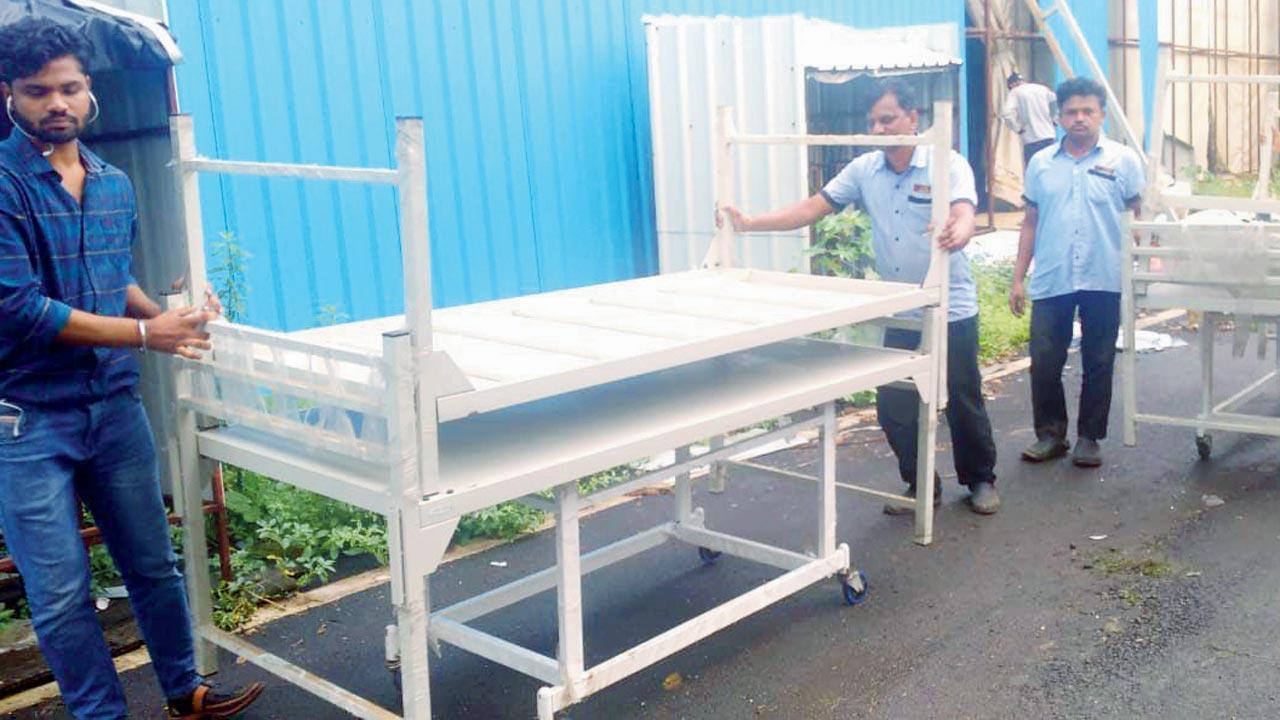Reputed doctors make case for giving items from defunct COVID centres to hospitals or auctioning them off

Beds being shifted from BKC jumbo COVID centre during its dismantling in the last week of September
Health experts have raised concerns about medical equipment from defunct jumbo COVID care units, stating that the state government should ensure they are put to use before they become unusable.
ADVERTISEMENT
mid-day in its article ‘Did political rally drive BMC to raze BKC jumbo centre’, dated October 20, highlighted how medical equipment and consumables from the Bandra Kurla Complex COVID centre were shifted to dismantle the entire structure.
BMC health department sources informed mid-day that 90 per cent of the furniture and fixtures at the centre—including linen, beds, cots and side lockers—belongs to the MMRDA. The remaining items, medical equipment and consumables, belong to the BMC. Some of these items were kept at Somaiya jumbo centre and the others in a storeroom at SevenHills Hospital, where they are yet to be put to use. Some items were given to the civic-run Sion, KEM, Nair and Cooper medical colleges.
‘Not left to rot’
Dr Wiqar Shaikh, professor of medicine, Grant Medical College and Sir JJ Group of Hospitals, said that plenty of medical equipment was purchased for jumbo centres such as ventilators, patient monitors, CPAP/ BIPAP machines, defibrillators, infusion pumps, syringe pumps and laboratory equipment for blood tests. The BMC had announced that this equipment would be transferred to municipal medical colleges and peripheral hospitals. He questioned whether this was indeed the case or whether the items are rotting in godowns. “This is worrisome because unseasonal rains have resulted in an increase in atmospheric moisture content and the approaching winter will result in a drop in temperature,” he said.
Also Read: Mumbai: Did political rally drive BMC to raze BKC jumbo centre?
He added that equipment need to be compulsorily stored in a controlled environment that is air-conditioned and has adequate pest, animal and dust control lest they get damaged.
India imports equipment
Dr Shaikh explained that although India ranks among the top 20 medical device markets in the world, nearly 80 per cent of its medical equipment is imported and India remains heavily dependent on foreign suppliers. He said that India imported medical equipments worth '63,200 crore in 2021. He added that it is extremely important that expensive and imported equipment be utilised for the benefit of the poor.
Tons of medical consumables
Dr Subhash Hira, professor of global health at University of Washington, Seattle, and an adviser to WHO-TDR-Geneva, said, “COVID-19 jumbo centres in Mumbai were stocked with items like hospital beds, surgical tables and ventilators and had tons of medical consumables and equipment that are designed to last for the next 5-10 years. In fact, with constant innovation happening every year, new models are making old ones obsolete quickly. This poses two problems for
hospitals when they decide to restart health facilities with or without ICUs: paying to upgrade equipment that was stored away some time ago and getting rid of outdated stuff that poses compatibility problems. Hospitals can’t throw used equipment in landfills.”
Devices become outdated
“While infrastructure and furniture can be preserved in a facility that is downsized during the lean period of the current pandemic, electronic and digital devices are likely to get outdated if they are stored away and will need spare parts to be rehabilitated. They can be kept in a low-functional state at infectious disease facilities or auctioned or donated to other hospitals,” said Dr Hira.
“Hospital staff trained in emergency care of pandemic patients is a valuable resource and should not be laid off in a rush,” he added.
Permanent damage
Dr Santosh Bansode, head of department, emergency medicines, Wockhardt Hospitals, said, “We have equipment and consumables from shut COVID centres, which were used during the initial two waves and subsequent cases of hospitalisation. Now that the COVID numbers are low, this equipment is not being used. If it remains unused, chances of it getting permanently damaged cannot be ruled out.”
“I firmly believe that we can, instead, give this equipment to health centres where it can be used and taken back if COVID patients increase.”
What to do with items once COVID centre is shut
According to Dr Subhash Hira, hospital and lab consumables and fragile pharmacy and lab supplies have expiry dates. They can be auctioned or donated to nearby hospitals.
Hospital furniture and infrastructure can be stored and reassembled later. Electronic devices, ICU installations, ventilators and radiology equipment can be stored for a short time. It is preferred that they are installed in nearby hospitals. Autoclaves, sterilisers, vehicles like ambulances, oxygen and waste management plants should be shifted to nearby hospitals or auctioned.
 Subscribe today by clicking the link and stay updated with the latest news!" Click here!
Subscribe today by clicking the link and stay updated with the latest news!" Click here!







